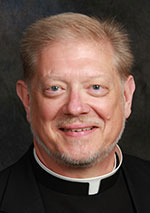That All May Be One / Fr. Rick Ginther
Interreligious dialogue has its roots in Vatican II
 I spent part of my vacation in Colorado at my youngest sister’s home attending the Catholic Association of Diocesan Ecumenical and Interreligious Officers’ (CADEIO) Interreligious Institute.
I spent part of my vacation in Colorado at my youngest sister’s home attending the Catholic Association of Diocesan Ecumenical and Interreligious Officers’ (CADEIO) Interreligious Institute.
Having attended the Ecumenical Institute in 2016, I had hoped to attend in 2017. Lack of registrations delayed participation year after year. Then when COVID-19 hit this spring, CADEIO went virtual this year. With lower cost and no travel, 17 participants took part.
For nine days, we spent 3 ½ hours each day learning from experts in the field of interreligious relations. It was enormously engaging for head and heart.
In this column and in September, I will share some highlights of what the Institute imparted.
Interreligious dialogue, we learned, finds it roots in Vatican II documents, particularly “In Our Time” in its entirety, but also in these numbered paragraphs in the following documents: “Dogmatic Constitution on the Church,” #16; “Declaration on Religious Freedom,” #3; “Decree on the Missionary Activity of the Church” #3, #34; and “Pastoral Constitution on the Church in the Modern World,” #22.
The paragraphs referenced above—and many others now posted on the archdiocesan Office of Ecumenical and Interreligious Affairs’ webpage—are but a taste of the Church’s mindset. They reveal through a hierarchy of texts (dogmatic, pastoral constitution, declaration, decree) that interreligious interactions are an integral part of what the Church is today.
Such dialogue is not an “extra.” It is a constitutive part of Church.
We also learned that a multitude of apostolic exhortations, encyclicals, homilies, addresses, apostolic letters and messages—by every pope since 1962—support our interreligious focus.
Some examples include:
• Pope Paul VI, on Sept. 29, 1963: “Look therefore beyond your own sphere and observe those other religious that uphold the meaning and the concept of God as one, Creator, provident, most high and transcendent, that worship God with acts of sincere piety and upon whose beliefs and practices the principles of moral and social life are founded.”
• Pope John Paul II, in “Mission of the Redeemer, #29: “Thus the Spirit, who ‘blows where he wills’ [Jn 3:8], who ‘was already at work in the world before Christ was glorified,’ [“Ad Gentes,” #4] and who ‘has filled the world … holds all things together [and] knows what is said’ [Wis 1:7], leads us to broaden our vision in order to ponder his activity in every time and place [“Dominum et Vivificantem,” #53]. I have repeatedly called this fact to mind, and it has guided me in my meetings with a wide variety of peoples. The Church’s relationship with other religions is dictated by a twofold respect: ‘Respect for man in his quest for answers to the deepest questions of his life, and respect for the action of the Spirit in man.’ ”
• Pope Benedict XVI, on April 27, 2008: “The broader purpose of dialogue is to discover the truth. What is the origin and destiny of mankind? What are good and evil? What awaits us at the end of our earthly existence? Only by addressing these deeper questions can we build a solid basis for the peace and security of the human family. … We are living in an age when these questions are too often marginalized. Yet they can never be erased from the human heart.”
• Pope Francis, on Sept. 21, 2014: “I … wish to mention something which is always an illusion: relativism. ‘Everything is relative’. In this regard, we must keep in mind a clear principle: we cannot enter into dialogue if we do not approach it from the perspective of our own identity. Without identity, there can be no dialogue. It would be an illusory dialogue, a dialogue without substance: it would serve no purpose. All of us have our own religious identity to which we are faithful. But the Lord knows how to guide history. May each one of us begin with our own identity, not pretending to have another, because it serves no end and does not help; it is relativism.”
You might want to take advantage of this year’s “virtual” Festival of Faiths, “Celebrating FaithFully: Our Faith, Traditions, Cultures, Community.” It will be held from 1-2:30 p.m. on Sept. 13. It can be accessed at www.festivaloffaiths.com; on Facebook at www.facebook.com/CenterForInterfaithCooperation; on Twitter at twitter.com/IndyCIC; and on YouTube at tinyurl.com/y44ydzau.
(Father Rick Ginther is director of the archdiocesan Office of Ecumenism and Interreligious Affairs. He is also the pastor of Our Lady of Lourdes Parish, Indianapolis.) †
 I spent part of my vacation in Colorado at my youngest sister’s home attending the Catholic Association of Diocesan Ecumenical and Interreligious Officers’ (CADEIO) Interreligious Institute.
I spent part of my vacation in Colorado at my youngest sister’s home attending the Catholic Association of Diocesan Ecumenical and Interreligious Officers’ (CADEIO) Interreligious Institute.